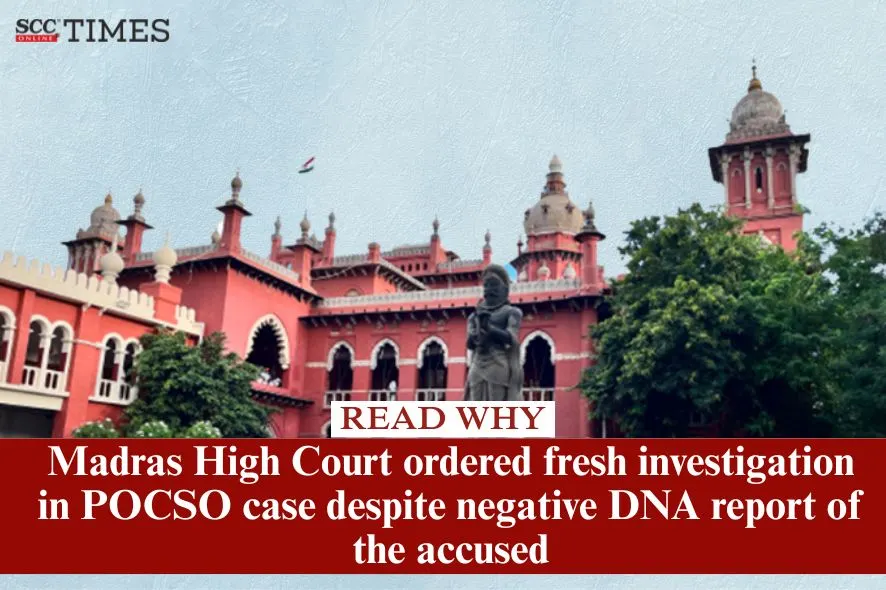Madras High Court: The present criminal revision petition was filed by the petitioner/accused under Section 397 read with 401 of the Criminal Procedure Code, 1973 (‘CrPC’) to call for records and set aside the order passed by the Sessions Judge, Mahila Court, Pudukkottai for offences under Sections 5(l), 5(j)(ii), 5(n) read with Section 6 of the Protection of Children from Sexual Offences Act, 2012 (‘POCSO Act’) and under Section 506 of the Penal Code, 1860 (‘IPC’). A Single Judge Bench of K. Murali Shankar*, J., whileexercising its powers under Section 482 CrPC, held that in light of the way the investigation was carried and the negative DNA report excluding the accused from being the father of the victim’s child, quashed the charge sheet filed against him and ordered a fresh investigation.
Background
In the matter in hand, victim, a 13-year-old girl, studying in Class 10, complained of stomach pain and so her mother-complainant took her to the hospital. On diagnosis, her family found that the girl was six months pregnant. Later, the girl revealed that the accused-her cousin, who worked at a hotel and had recently returned to the village, had promised to marry her and took her to a nearby house under construction, where he had sexual intercourse with her three times. Thereafter, her mother filed a police complaint the same day and an FIR was registered under Section 506 IPC and multiple provisions of the POCSO Act. The accused was arrested, remanded to judicial custody and was later released on bail in December 2020 by the Mahila Court.
The police completed the investigation, submitted the final report, and framed charges. Thereafter, the accused filed a petition seeking a direction to the police to take necessary steps to conduct his DNA test.
Later, the DNA test results from the Forensic Sciences Department, Chennai concluded that the accused was not the father of the victim’s child. The accused filed for discharge under Section 227 CrPC, but the same was dismissed by the Mahila Court. Thus, being aggrieved by the said decision, he filed the present revision petition.
Analysis, Law and Decision
The Court stated that the prosecution’s case had two aspects: firstly, the accused allegedly committed penetrative sexual assault on the victim girl thrice, and secondly, the victim girl became pregnant through the accused. The Court took note of the DNA report and stated that the same contradicted the second claim, but the prosecution might still prove the penetrative sexual assault charge, as the possibility remained that another individual impregnated the victim, resulting in the birth of a male child.
The Court expressed its shocking stating that despite negative DNA report, the prosecution did not seek the Court’s permission to further investigate to identify the individual responsible for the victim’s pregnancy as there could be two possibilities, first, two perpetrators, with one responsible for the pregnancy, or second, a single perpetrator responsible for both assault and pregnancy, potentially exonerating the accused. Thus, the Court opined that further investigation was crucial to determine the actual culprit and the accused’s involvement, if any.
The Court opined that POCSO offences were grave and demand stringent punishments along with meticulous investigations to deliver justice. However, some cases suffer from casual and mechanical investigation, that ignore their serious impact. It was imperative for the prosecution to conduct thorough and proper investigations reflecting the severity of these offences.
The Court stated that though discharge petitions were generally not entertained after charges were framed, but in this case, the accused initiated a DNA test whose negative report was received post-charge framing. Considering this significant development, the Court could invoke Section 482 CrPC to uphold justice and fairness in the proceedings.
The Court, after considering the investigation’s flaws, the negative DNA report, and the need for justice, exercised its power under Section 482 CrPC, and quashed the charge sheet and ordered a re-investigation by a Deputy Superintendent of Police within three months. The Court further suggested that to protect the child’s interests, the police must identify the real culprit. While Section 53-A CrPC required arrest before medical examination, the Court permitted DNA testing of the accusedto avoid arrest of the suspected persons. The Court clarified that the accused was not exonerated, and the Investigating Officer must continue probing his involvement.
[X v. State of T.N., 2025 SCC OnLine Mad 3178, decided on 20-6-2025]
Advocates who appeared in this case :
For the Petitioner: Advocate G. Karuppasamy Pandian and Advocate A. Purantharadhas;
For the Respondent: Government Advocate M. Aasha




